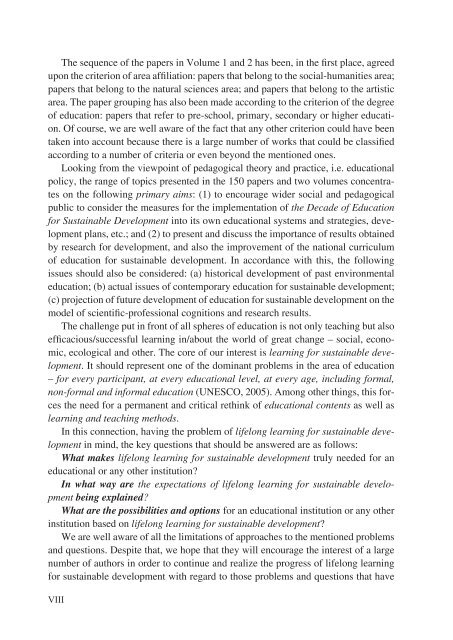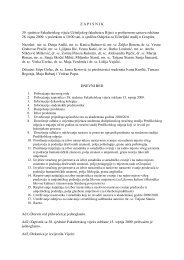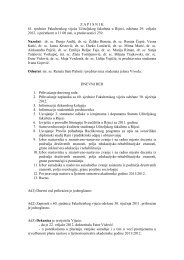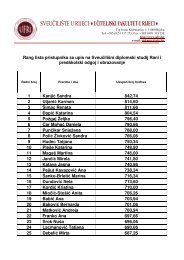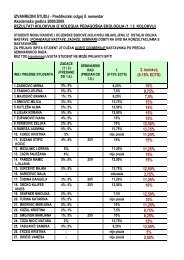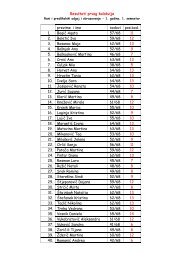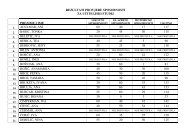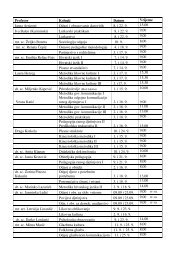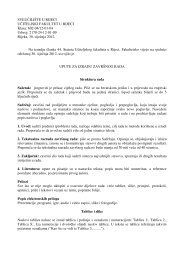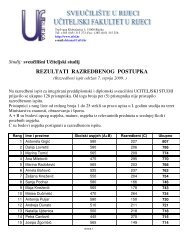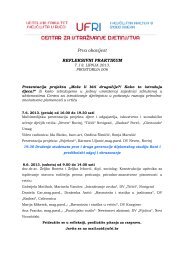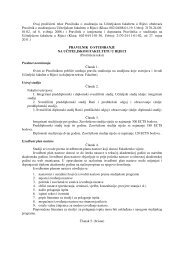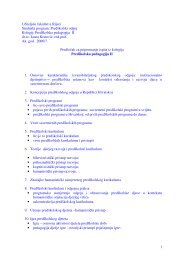- Page 1: Urednice / EditorsVinka UzelacLidij
- Page 5: Cjelovito gledano, radovi u knjizi
- Page 15 and 16: TEORIJSKO-PRAKTIČNI OKVIR CJELOŽI
- Page 17 and 18: V. Uzelac, TEORIJSKO-PRAKTIČNI OKV
- Page 19 and 20: V. Uzelac, TEORIJSKO-PRAKTIČNI OKV
- Page 21 and 22: V. Uzelac, TEORIJSKO-PRAKTIČNI OKV
- Page 23 and 24: V. Uzelac, TEORIJSKO-PRAKTIČNI OKV
- Page 25 and 26: V. Uzelac, TEORIJSKO-PRAKTIČNI OKV
- Page 27 and 28: V. Uzelac, TEORIJSKO-PRAKTIČNI OKV
- Page 29 and 30: V. Uzelac, TEORIJSKO-PRAKTIČNI OKV
- Page 31 and 32: V. Uzelac, TEORIJSKO-PRAKTIČNI OKV
- Page 33 and 34: V. Uzelac, TEORIJSKO-PRAKTIČNI OKV
- Page 35 and 36: V. Uzelac, TEORIJSKO-PRAKTIČNI OKV
- Page 37 and 38: V. Uzelac, TEORIJSKO-PRAKTIČNI OKV
- Page 39 and 40: V. Uzelac, TEORIJSKO-PRAKTIČNI OKV
- Page 41 and 42: V. Uzelac, THEORETICAL-PRACTICAL FR
- Page 43 and 44: V. Uzelac, THEORETICAL-PRACTICAL FR
- Page 45 and 46: V. Uzelac, THEORETICAL-PRACTICAL FR
- Page 47 and 48: V. Uzelac, THEORETICAL-PRACTICAL FR
- Page 49 and 50: V. Uzelac, THEORETICAL-PRACTICAL FR
- Page 51 and 52: V. Uzelac, THEORETICAL-PRACTICAL FR
- Page 53 and 54: V. Uzelac, THEORETICAL-PRACTICAL FR
- Page 55 and 56: V. Uzelac, THEORETICAL-PRACTICAL FR
- Page 57 and 58:
V. Uzelac, THEORETICAL-PRACTICAL FR
- Page 59 and 60:
V. Uzelac, THEORETICAL-PRACTICAL FR
- Page 61 and 62:
V. Uzelac, THEORETICAL-PRACTICAL FR
- Page 63 and 64:
V. Uzelac, THEORETICAL-PRACTICAL FR
- Page 65 and 66:
V. Uzelac, THEORETICAL-PRACTICAL FR
- Page 67 and 68:
GLOBALNE DIMENZIJE ODRŽIVA RAZVOJA
- Page 69 and 70:
Globalizacija kao pojavaV. Previši
- Page 71 and 72:
V. Previšić, GLOBALNE DIMENZIJE O
- Page 73 and 74:
V. Previšić, GLOBALNE DIMENZIJE O
- Page 75 and 76:
V. Previšić, GLOBALNE DIMENZIJE O
- Page 77 and 78:
V. Previšić, GLOBALNE DIMENZIJE O
- Page 79 and 80:
P. Lučin, S. Milovanović, J. Trku
- Page 81 and 82:
P. Lučin, S. Milovanović, J. Trku
- Page 83 and 84:
P. Lučin, S. Milovanović, J. Trku
- Page 85 and 86:
P. Lučin, S. Milovanović, J. Trku
- Page 87 and 88:
P. Lučin, S. Milovanović, J. Trku
- Page 89 and 90:
P. Lučin, S. Milovanović, J. Trku
- Page 91 and 92:
P. Lučin, S. Milovanović, J. Trku
- Page 93 and 94:
P. Lučin, S. Milovanović, J. Trku
- Page 95 and 96:
M. Matijević, ULOGA MEDIJA U OSTVA
- Page 97 and 98:
M. Matijević, ULOGA MEDIJA U OSTVA
- Page 99 and 100:
M. Matijević, ULOGA MEDIJA U OSTVA
- Page 101 and 102:
M. Matijević, ULOGA MEDIJA U OSTVA
- Page 103 and 104:
M. Matijević, ULOGA MEDIJA U OSTVA
- Page 105 and 106:
SOCIOLOŠKE DIMENZIJE ODGOJA IOBRAZ
- Page 107 and 108:
Uvodne napomeneV. Lay; J. Puđak, S
- Page 109 and 110:
V. Lay; J. Puđak, SOCIOLOŠKE DIME
- Page 111 and 112:
V. Lay; J. Puđak, SOCIOLOŠKE DIME
- Page 113 and 114:
V. Lay; J. Puđak, SOCIOLOŠKE DIME
- Page 115 and 116:
V. Lay; J. Puđak, SOCIOLOŠKE DIME
- Page 117 and 118:
D. Garašić, ODGOJ I OBRAZOVANJE U
- Page 119 and 120:
D. Garašić, ODGOJ I OBRAZOVANJE U
- Page 121 and 122:
D. Garašić, ODGOJ I OBRAZOVANJE U
- Page 123 and 124:
D. Garašić, ODGOJ I OBRAZOVANJE U
- Page 125 and 126:
D. Garašić, ODGOJ I OBRAZOVANJE U
- Page 127 and 128:
EDUKACIJA, VRIJEDNOST I ODRŽIVI RA
- Page 129 and 130:
N. Babić; S. Irović; A. Sentjabov
- Page 131 and 132:
N. Babić; S. Irović; A. Sentjabov
- Page 133 and 134:
CJELOŽIVOTNO UČENJE ZA ODRŽIVI R
- Page 135 and 136:
L. Vujičić, CJELOŽIVOTNO UČENJE
- Page 137 and 138:
L. Vujičić, CJELOŽIVOTNO UČENJE
- Page 139 and 140:
L. Vujičić, CJELOŽIVOTNO UČENJE
- Page 141 and 142:
R. Relja; M. Ljubetić, ETNOGRAFIJA
- Page 143 and 144:
R. Relja; M. Ljubetić, ETNOGRAFIJA
- Page 145 and 146:
R. Relja; M. Ljubetić, ETNOGRAFIJA
- Page 147 and 148:
R. Čepić; J. Krstović, CJELOŽIV
- Page 149 and 150:
R. Čepić; J. Krstović, CJELOŽIV
- Page 151 and 152:
R. Čepić; J. Krstović, CJELOŽIV
- Page 153 and 154:
M. Černetič; O. Dečman Dobrnjič
- Page 155 and 156:
M. Černetič; O. Dečman Dobrnjič
- Page 157 and 158:
M. Černetič; O. Dečman Dobrnjič
- Page 159 and 160:
ČOVJEK I UMJETNOST U KONTEKSTUKONC
- Page 161 and 162:
M. Uberman, ČOVJEK I UMJETNOST U K
- Page 163 and 164:
M. Uberman, ČOVJEK I UMJETNOST U K
- Page 165 and 166:
CJELOŽIVOTNO UČENJE ZA ODRŽIVI R
- Page 167 and 168:
R. Sam Palmić; G. Ercegovac-Jagnji
- Page 169 and 170:
R. Sam Palmić; G. Ercegovac-Jagnji
- Page 171 and 172:
R. Sam Palmić; G. Ercegovac-Jagnji
- Page 173 and 174:
K. Szmyd, CJELOŽIVOTNO OBRAZOVANJE
- Page 175 and 176:
K. Szmyd, CJELOŽIVOTNO OBRAZOVANJE
- Page 177 and 178:
K. Szmyd, CJELOŽIVOTNO OBRAZOVANJE
- Page 179 and 180:
E. Bartkevicius; N. Petkeviciute; A
- Page 181 and 182:
E. Bartkevicius; N. Petkeviciute; A
- Page 183 and 184:
E. Bartkevicius; N. Petkeviciute; A
- Page 185 and 186:
Ž. Požega, B. Crnković, M. Čuk
- Page 187 and 188:
Ž. Požega, B. Crnković, M. Čuk
- Page 189 and 190:
Ž. Požega, B. Crnković, M. Čuk
- Page 191 and 192:
EKONOMSKI ASPEKTI CJELOŽIVOTNOG U
- Page 193 and 194:
M. Peršić; V. Ivanović, EKONOMSK
- Page 195 and 196:
M. Peršić; V. Ivanović, EKONOMSK
- Page 197 and 198:
M. Peršić; V. Ivanović, EKONOMSK
- Page 199 and 200:
M. Peršić; V. Ivanović, EKONOMSK
- Page 201 and 202:
M. Peršić; V. Ivanović, EKONOMSK
- Page 203 and 204:
M. Peršić; V. Ivanović, EKONOMSK
- Page 205 and 206:
POTROŠAČKO UČENJE KAO DIO SISTEM
- Page 207 and 208:
M. Ďuriš; J. Pavlovkin, POTROŠA
- Page 209 and 210:
M. Ďuriš; J. Pavlovkin, POTROŠA
- Page 211 and 212:
J. Lepičnik-Vodopivec, NEKI ASPEKT
- Page 213 and 214:
J. Lepičnik-Vodopivec, NEKI ASPEKT
- Page 215 and 216:
J. Lepičnik-Vodopivec, NEKI ASPEKT
- Page 217 and 218:
J. Lepičnik-Vodopivec, NEKI ASPEKT
- Page 219 and 220:
J. Lepičnik-Vodopivec, NEKI ASPEKT
- Page 221 and 222:
TRANSFORMACIJA DJEČJIH VRTIĆA U B
- Page 223 and 224:
A. Miljak, TRANSFORMACIJA DJEČJIH
- Page 225 and 226:
A. Miljak, TRANSFORMACIJA DJEČJIH
- Page 227 and 228:
UČENJE DJECE PREDŠKOLSKE DOBI KAO
- Page 229 and 230:
Z. Baďuríková, UČENJE DJECE PRE
- Page 231 and 232:
Z. Baďuríková, UČENJE DJECE PRE
- Page 233 and 234:
OSPOSOBLJAVANJE ODGOJNO-OBRAZOVNEUS
- Page 235 and 236:
E. Slunjski, OSPOSOBLJAVANJE ODGOJN
- Page 237 and 238:
E. Slunjski, OSPOSOBLJAVANJE ODGOJN
- Page 239 and 240:
NOVIJI, SUVREMENI PRISTUP SHVAĆANJ
- Page 241 and 242:
A. Jurčević Lozanić, NOVIJI, SUV
- Page 243 and 244:
A. Jurčević Lozanić, NOVIJI, SUV
- Page 245 and 246:
PLURALIZAM - ISHODIŠTE CJELOŽIVOT
- Page 247 and 248:
V. Katić, PLURALIZAM - ISHODIŠTE
- Page 249 and 250:
V. Katić, PLURALIZAM - ISHODIŠTE
- Page 251 and 252:
MOGUĆNOSTI I GRANICE UČENJA ZA OD
- Page 253 and 254:
M. Andevski, MOGUĆNOSTI I GRANICE
- Page 255 and 256:
M. Andevski, MOGUĆNOSTI I GRANICE
- Page 257 and 258:
POLOŽAJ UČENIKA U NASTAVI(JUČER-
- Page 259 and 260:
A. Peko; V. Mlinarević; V. Gajger,
- Page 261 and 262:
A. Peko; V. Mlinarević; V. Gajger,
- Page 263 and 264:
SU-OBLIKOVANJE PROSTORA U FUNKCIJIU
- Page 265 and 266:
M. Duh, J. Batič, SU-OBLIKOVANJE P
- Page 267 and 268:
M. Duh, J. Batič, SU-OBLIKOVANJE P
- Page 269 and 270:
KORELATIVNA NASTAVA - INTEGRIRANJEJ
- Page 271 and 272:
A. Uberman, KORELATIVNA NASTAVA...a
- Page 273 and 274:
A. Uberman, KORELATIVNA NASTAVA...o
- Page 275 and 276:
RAZUMIJEVANJE ODRŽIVOG RAZVOJA - G
- Page 277 and 278:
J. Ledić; B. Ćulum; L. Pavić-Rog
- Page 279 and 280:
J. Ledić; B. Ćulum; L. Pavić-Rog
- Page 281 and 282:
J. Ledić; B. Ćulum; L. Pavić-Rog
- Page 283 and 284:
J. Ledić; B. Ćulum; L. Pavić-Rog
- Page 285 and 286:
J. Ledić; B. Ćulum; L. Pavić-Rog
- Page 287 and 288:
J. Ledić; B. Ćulum; L. Pavić-Rog
- Page 289 and 290:
A. Klapan; S. Vrcelj; S. Kušić, C
- Page 291 and 292:
A. Klapan; S. Vrcelj; S. Kušić, C
- Page 293 and 294:
A. Klapan; S. Vrcelj; S. Kušić, C
- Page 295 and 296:
P. Dyachuk; A. Sentyabov; L. Pustov
- Page 297 and 298:
P. Dyachuk; A. Sentyabov; L. Pustov
- Page 299 and 300:
P. Dyachuk; A. Sentyabov; L. Pustov
- Page 301 and 302:
CJELOŽIVOTNO OBRAZOVANJE NASTAVNIK
- Page 303 and 304:
I. Radeka; R. Petani; A. Rogić,CJE
- Page 305 and 306:
I. Radeka; R. Petani; A. Rogić,CJE
- Page 307 and 308:
ODREĐENA SOCIOLOŠKA VIĐENJA POLO
- Page 309 and 310:
J. Bezenšek, ODREĐENA SOCIOLOŠKA
- Page 311 and 312:
J. Bezenšek, ODREĐENA SOCIOLOŠKA
- Page 313 and 314:
J. Bezenšek, ODREĐENA SOCIOLOŠKA
- Page 315 and 316:
J. Bezenšek, ODREĐENA SOCIOLOŠKA
- Page 317 and 318:
Ž. Boneta; M. Mrakovčić, PROFESI
- Page 319 and 320:
Ž. Boneta; M. Mrakovčić, PROFESI
- Page 321 and 322:
Ž. Boneta; M. Mrakovčić, PROFESI
- Page 323 and 324:
PROMICANJE UČENJA ZA ODRŽIVI RAZV
- Page 325 and 326:
Cilj i metoda istraživanjaE. Bori
- Page 327 and 328:
E. Borić; R. Jindra; A. Škugor, P
- Page 329 and 330:
E. Borić; R. Jindra; A. Škugor, P
- Page 331 and 332:
N. Vlah; E. Vejo, LATENTNI FAKTORI
- Page 333 and 334:
N. Vlah; E. Vejo, LATENTNI FAKTORI
- Page 335 and 336:
N. Vlah; E. Vejo, LATENTNI FAKTORI
- Page 337 and 338:
ODRŽIVI RAZVOJ U KONTEKSTU PEDAGO
- Page 339 and 340:
S. Močinić; I. Ćatić; S. Tatkov
- Page 341 and 342:
S. Močinić; I. Ćatić; S. Tatkov
- Page 343:
S. Močinić; I. Ćatić; S. Tatkov


